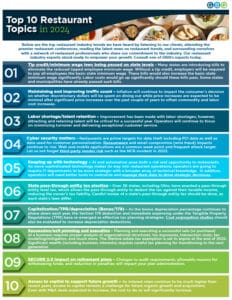Keeping up with the ever-changing business environment doesn’t have to be taxing! Check out the top 10 restaurant topics we’re keeping an eye on.
- Tip credit/minimum wage laws being passed on state levels – Many states are introducing bills to eliminate the reduced tipped employee minimum wage. Without a tip credit, employers will be required to pay all employees the basic state minimum wage. These bills would also increase the basic state minimum wage significantly. Labor costs would go up significantly should these bills pass. Some states and municipalities have already passed such bills.
- Maintaining and improving traffic count – Inflation will continue to impact the consumer’s decision on whether discretionary dollars will be spent on dining out, while price increases are expected to be minimal after significant price increases over the past couple of years to offset commodity and labor cost increases.
- Labor shortage/talent retention – Improvement has been made with labor shortages; however, attracting and retaining talent will be critical for a successful year. Operators will continue to focus on minimizing turnover and delivering exceptional customer service.

- Cyber security matters – Restaurants are prime targets for data theft including PCI data as well as data used for customer personalization. Ransomware and email compromise (wire fraud) impacts continue to rise. Web and mobile applications are a common weak point and frequent attack targets. Let us not forget third-party vendor risk such as the NCR incident in 2023.
- Keeping up with technology – AI and automation pose both a risk and opportunity to restaurants. As more sophisticated technology makes its way into restaurant operations, operators are going to require IT departments to be more strategic with a broader array of technical knowledge. In addition, operators will need better tools to centralize and manage their data to drive strategic decisions.
- State pass-through entity tax election – Over 36 states, including Ohio, have enacted a pass-through entity level tax, which allows the pass-through entity to deduct the tax against their taxable income, reducing the owner’s tax liability. Careful review of a state’s pass-through entity tax should be done, as each state’s laws differ.
- Capitalization/TPR/depreciation (Bonus/179) – As the bonus depreciation percentage continues to phase down each year, the Section 179 deduction and immediate expensing under the Tangible Property Regulations (TPR) have re-emerged as effective tax planning strategies. Cost segregation studies should also be evaluated to increase depreciation deductions.
- Succession/exit planning and execution – Planning and executing a successful sale (or purchase) of a business requires proper analysis of organizational structures, tax exposures, transaction costs, tax modeling/mitigation, and much more. The lifetime estate tax exemption is set to expire at the end of 2025. Significant wealth (including business interests) requires careful tax planning for transitioning to the next generation.
- SECURE 2.0 impact on retirement plans – Changes to audit requirements, allowable reasons for withdrawing funds, and reduction in penalties will impact your plan administration.
- Access to capital to support future growth – As interest rates continue to be much higher than recent years, access to capital remains a challenge for future organic growth and acquisitions. Even with M&A deals expected to increase, the cost to do so will significantly increase.
Our restaurant industry experts stand ready to empower growth. Contact GBQ today.
Share via email
« Back
Print
